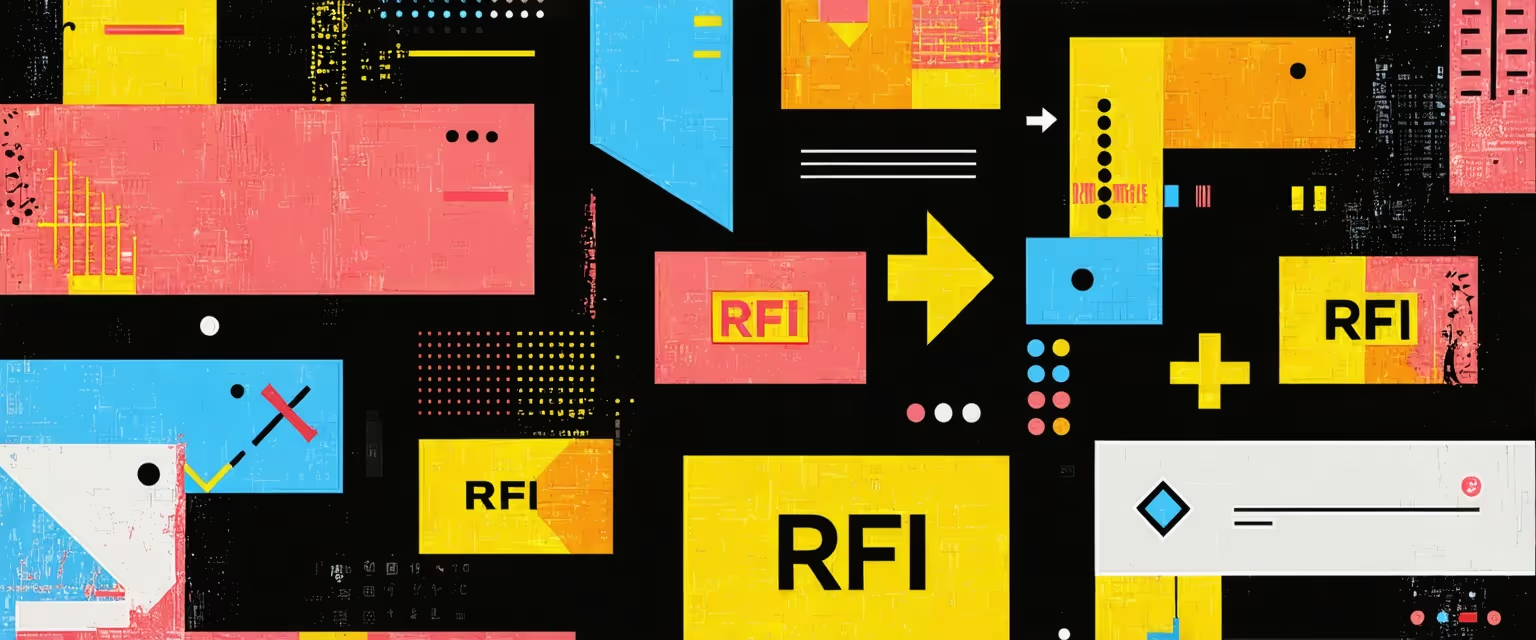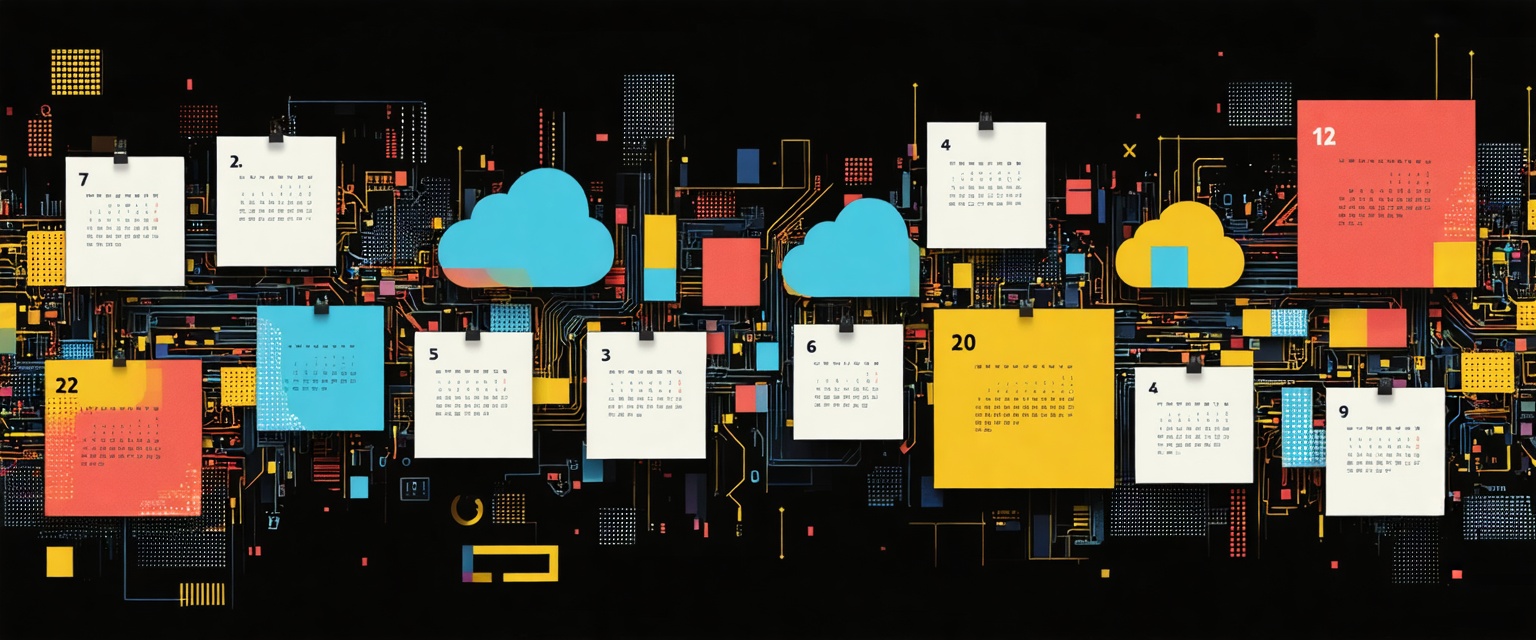Transform your Procore RFI process with AI agents. Speed up routing and enhance efficiency to cut delays and save costs in construction projects.
Construction project engineers face delays and errors as RFI routing breaks down across fragmented systems. Manually transferring information between disconnected platforms slows response times and increases the risk of missed RFIs.
The root cause is a lack of integration that prevents seamless data flow between critical tools.
Thanks to advancements in agentic AI, Procore RFI routing can now be intelligently automated. Datagrid’s data connectors create seamless data pathways, enabling AI agents to transfer information.
This article explores how AI agents automate Procore RFI routing intelligence for project engineers.
What is RFI Routing in Procore?
RFI routing in Procore refers to the process of directing requests for information to appropriate stakeholders for resolution within the construction management platform. This critical workflow ensures queries reach the right team members quickly, particularly on large-scale projects juggling numerous concurrent RFIs across diverse stakeholders.
The traditional RFI workflow looks something like this:
- Receiving and logging the RFI
- Analyzing the content and context
- Identifying the appropriate responder
- Assigning and sending the RFI
- Tracking status and following up
This gets messy fast when you're handling multiple RFIs. Each RFI costs significant money to process, adding up to substantial amounts on typical large projects.
Many RFIs get no response at all, causing delays, confusion, and safety risks.
Effective Procore RFI routing intelligence is essential for project engineers. It requires knowing who does what, who knows what, and what's happening where.
The real challenge is getting each question to the right expert while managing the flood of requests that complex projects generate.
Procore makes this easier with centralized management, custom workflows, automatic notifications, and real-time tracking that cuts down busywork and speeds up responses.
Why Efficient Procore RFI Routing Matters for Project Engineers
For project engineers, RFI management can make or break your construction timeline. When RFIs get lost or delayed, everything suffers.
Work grinds to a halt while teams wait for answers. Costs pile up as delays tick on. Teams start making decisions without proper information.
The money drain is real. Each RFI costs significant money to process, adding up to substantial sums on large projects.
Unanswered RFIs create real problems:
- Workers standing around confused
- Construction moving forward incorrectly or unsafely
- Legal headaches down the road
As a project engineer, you're the nerve center of this process, making sure questions find answers quickly and keeping information flowing.
Efficient Procore RFI routing intelligence lets you cut paperwork, avoid mistakes, keep things moving, and maintain a paper trail.
Streamline your RFI handling, and you'll spend more time engineering and less time shuffling papers. Unnecessary RFIs waste significant money per project that you could save with better systems.
As buildings get more complex, mastering Procore RFI routing intelligence becomes a superpower for engineers who want to deliver on time and on budget.
Common Bottlenecks Slowing Down Manual RFI Routing
Manual RFI routing creates significant inefficiencies that impact project timelines and budgets. Similar challenges are faced in other areas, where AI-driven automation in proposals has shown efficiency boosts. Here are the key bottlenecks:
High Administrative Burden
Project engineers must:
- Log each RFI in spreadsheets or forms
- Track multiple RFIs simultaneously
- Ensure proper documentation and filing
This busywork drowns engineers, especially on big projects with lots of questions.
Delays in Routing and Response
Manual routing means:
- Digging through documents to find the right person
- Sending emails and messages to forward questions
- Chasing people down for answers
This creates huge delays, with many RFIs getting no answer at all. These delays freeze construction, confuse workers, and sometimes lead to incorrect building.
Poor Communication and Visibility
Paper-based or basic digital systems lack:
- Real-time status updates
- Comprehensive dashboards
- Clear tracking mechanisms
This foggy view leads to mixed messages, duplicate questions, or contradictory instructions.
Increased Risk of Errors and Rework
Human routing means human error:
- Questions sent to the wrong expert
- Requests buried in email inboxes
- Mistakes when copying information
These errors can cause big problems, like incorrectly built components that need costly demolition and rebuilding.
Difficulty in Prioritization and Analysis
Without smart systems, engineers struggle to:
- Prioritize urgent RFIs
- Spot patterns in recurring issues
- Track performance metrics
This makes it hard to improve the process over time.
Stakeholder Fatigue and Overload
A flood of manually routed RFIs causes:
- Overwhelmed design teams
- Important questions buried under minor ones
- Hasty, incomplete answers
This leads to slow or inadequate responses, further delaying projects and potentially compromising quality.
These bottlenecks show why we need smarter, automated solutions to speed up communication, reduce delays, and build more efficiently.
How AI Agents Automate Procore RFI Routing Intelligence
AI agents in Procore completely reshape RFI handling and enhance AI in construction communication. They read requests, find the right person, and route automatically, turning a manual headache into a smooth, efficient process for project engineers.
Analyzing RFI Content with Natural Language Processing
Procore's AI reads and understands what each RFI is asking. It picks out key details, figures out what information is needed, and scans related documents and past RFIs for context.
The system can determine when conversations need direction change and provide recommendations based on similar RFIs from other projects.
Using Machine Learning to Identify the Right Team Member
The AI matches each question with the perfect person to answer it. It looks at roles, expertise areas, and past assignments to make smart routing decisions.
The system gets smarter with every RFI it processes, learning from past successes.
Automating and Accelerating the Routing Process
Gone are the days of manual email chains and chasing down answers. The AI instantly routes each RFI to the right person, sending real-time AI notifications, cutting response times, eliminating communication gaps, and reducing mistakes.
Driving Proactive, Intelligent RFI Management
AI turns RFI handling from reactive paper-pushing into a smart, proactive system, and can even automate construction safety. This ripples through your entire project workflow, speeding up collaboration, breaking through bottlenecks, and keeping projects on track.
With AI handling the routine stuff, engineers can focus on complex problems that need human expertise.
Datagrid: AI-Driven Software Integrations for Construction
Construction companies use many different software platforms to manage projects. From BIM and CAD to project management and ERP systems, there's plenty of data, but it's often scattered across systems.
Datagrid's AI platform connects these islands of information.
Seamless Cross-Platform Data Exchange
Datagrid links your entire software ecosystem, including Procore, Autodesk BIM 360, PlanGrid, Primavera P6, and more. This lets AI agents pull, analyze, and sync information across previously disconnected platforms, creating one source of truth for your project data.
Automated Drawing and Model Analysis
The AI reads thousands of CAD drawings and BIM models without human help. It extracts data, spots potential clashes, and calculates material quantities automatically.
This saves countless hours and reduces errors in critical calculations.
RFI and Submittal Workflow Acceleration
AI agents monitor RFIs and submittals across systems, routing documents, identifying holdups, and highlighting critical items to streamline submittal cross-checking. This keeps projects moving and makes teams more productive.
Change Order Intelligence
The AI studies change orders across projects to find patterns in scope changes, pricing, and approval times. This helps standardize processes and improves forecasting, so teams manage changes better.
Schedule and Budget Integration
By connecting scheduling tools with financial systems, Datagrid's AI finds resource conflicts, cash flow impacts, and critical dependencies across your projects. This big-picture view leads to better decisions and more proactive management.
Field Report Consolidation
Datagrid automatically compiles daily reports, safety observations, and quality checks from multiple sources into complete status updates without manual work. This ensures everyone has current, accurate project information.
Historical Project Data Mining
The AI extracts insights from completed project records to inform estimates, identify best practices, and predict potential issues on similar future projects. This data-driven approach cuts risk and improves outcomes.
With Datagrid's AI integration, your construction team can break down data silos, stop duplicate data entry, see across your entire technology stack, and deliver projects more efficiently with fewer delays and information gaps.
Simplify Construction Tasks with Datagrid's Agentic AI
Don't let data complexity slow down your team. Datagrid's AI-powered platform is designed specifically for teams who want to:
- Automate tedious data tasks
- Reduce manual processing time
- Gain actionable insights instantly
- Improve team productivity
See how Datagrid can help you increase process efficiency.












